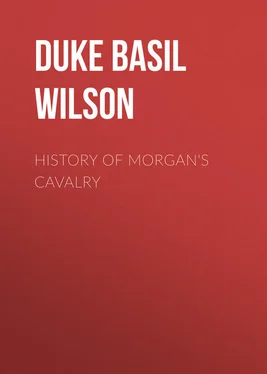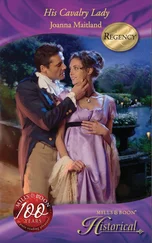Basil Duke - History of Morgan's Cavalry
Здесь есть возможность читать онлайн «Basil Duke - History of Morgan's Cavalry» — ознакомительный отрывок электронной книги совершенно бесплатно, а после прочтения отрывка купить полную версию. В некоторых случаях можно слушать аудио, скачать через торрент в формате fb2 и присутствует краткое содержание. Издательство: Иностранный паблик, Жанр: foreign_antique, foreign_prose, на английском языке. Описание произведения, (предисловие) а так же отзывы посетителей доступны на портале библиотеки ЛибКат.
- Название:History of Morgan's Cavalry
- Автор:
- Издательство:Иностранный паблик
- Жанр:
- Год:неизвестен
- ISBN:нет данных
- Рейтинг книги:3 / 5. Голосов: 1
-
Избранное:Добавить в избранное
- Отзывы:
-
Ваша оценка:
- 60
- 1
- 2
- 3
- 4
- 5
History of Morgan's Cavalry: краткое содержание, описание и аннотация
Предлагаем к чтению аннотацию, описание, краткое содержание или предисловие (зависит от того, что написал сам автор книги «History of Morgan's Cavalry»). Если вы не нашли необходимую информацию о книге — напишите в комментариях, мы постараемся отыскать её.
History of Morgan's Cavalry — читать онлайн ознакомительный отрывок
Ниже представлен текст книги, разбитый по страницам. Система сохранения места последней прочитанной страницы, позволяет с удобством читать онлайн бесплатно книгу «History of Morgan's Cavalry», без необходимости каждый раз заново искать на чём Вы остановились. Поставьте закладку, и сможете в любой момент перейти на страницу, на которой закончили чтение.
Интервал:
Закладка:
A day or two after these occurrences, Morgan went with a flag of truce to Mitchell's encampment to endeavor to exchange some of his prisoners for his own men who had been captured. Colonel Wood, who was with him, was asked confidentially how many men Morgan had, and was told that the mischief he was doing could only be accounted for upon the supposition that he had control of a large force. Wood answered, also in confidence , that although he had co-operated with Morgan for two or three weeks, he was entirely ignorant of the strength of his command. That he knew, only, that Morgan was controlling the motions of men whom he (Morgan) rarely saw; and that, although he himself was intimately cognizant of all that occurred under Morgan's immediate supervision, he was frequently astonished by hearing from the latter, accounts of enterprises which had been accomplished by his orders in quarters very remote from where he was in person operating. Wood saw the impression which prevailed, and shaped his answers to confirm it. In reality, there were not in the vicinity of Nashville, at that time, on all sides, more than three hundred Confederate soldiers. Of this number, Morgan could control only his own three companies and the fifty men with Wood, although the others, who were stragglers, and furloughed men from the Texas Rangers, Starne's, McNairy's and other cavalry regiments, often joined him upon his expeditions.
Many of the Federal soldiers killed around Nashville, and whose deaths were, charged to Morgan's men, were killed by the independent partisans, most of them men who lived in the neighboring country, and had obtained leave to linger, for a while, about their homes. Great zeal and activity, however, was displayed by all parties.
When the flag of truce party mentioned above got to the picket line, it was met by an expedition consisting of cavalry, artillery and infantry, riding in wagons, en route for Murfreesboro', with the expectation of capturing Morgan's entire band. General Mitchell was very angry when the arrival of the flag was announced, and complained that Morgan had taken that method of defeating his plans, that otherwise would have been assuredly successful. This charge created a good deal of amusement, when Morgan told the story later to his brother officers of Johnson's array. Even if Morgan (as Mitchell thought), had known that an expedition was on foot for his capture, he still would have had a perfect right to transact at that time – if listened to – any matter of business which required to be done under flag of truce. It is legitimate to send them even while battles are going on.
During the entire war, both sides used to send flags of truce for quite other purposes than the ostensible ones. Morgan was the commanding Confederate officer in all that region, and had a right to send flags of truce for any purpose whatever, so long as he observed the usages which govern them. The flag of truce need not have stopped the expedition.
It was Mitchell's own fault if it was allowed to go far enough to see what he wished to conceal. It is the right and positive duty of an officer in charge of a flag, to go as far as he is permitted. General Mitchell could have refused to receive it, and have ordered it back. Morgan's friends somewhat doubted whether this expedition (even if it had not been met and checked by the flag of truce), would have resulted in Morgan's capture. General Mitchell was a profound strategist, but he was going to travel by daylight through a country full of Morgan's friends, and upon a road constantly watched by his scouts, to surprise Morgan. At any rate, it may be safely asserted that the fond hope which General Mitchell cherished, could never have been realized, after Morgan had gotten such timely information of an expedition intended for his capture, that he was able to meet it with a flag of truce as it was just setting out.
The country around Nashville, in which Morgan did the service, which I have attempted to describe, is one admirably adapted to it. It is one of the most fertile and wealthy portions of Middle Tennessee, a region unsurpassed in productiveness. Yet teeming as it is with every crop which the farmer wishes, one would think, in riding along the fine turnpikes which enter Nashville upon all sides, that a comparatively small proportion of the land is cultivated. A dense growth of timber, principally cedar, stretches, sometimes for miles, along the roads, and runs back from them, occasionally, to considerable distances. The cedar glades, are, some of them, of great extent, and are penetrated in all directions by roads. Springs, and small watercourses, are frequent. It is indeed a beautiful country, and the paradise of partisan cavalry, who can find in it, every where, supplies for men and horses, shelter to hide them, going against and escaping from an enemy, and, stop where they will, all that makes a camp happy.
The people who live in this country are worthy to possess it. They are brave, frank, generous and hospitable – true to their friends, kind to the distressed. They are just and honorable, and uphold through all trials and evils, the right, as they understand it, and their plighted word. Come what will upon this country, may God bless the people of Middle Tennessee.
Two or three days after the flag of truce affair, Morgan determined upon an expedition to a different quarter from that in which he had been hitherto employed. It was high time that, in accordance with the instructions he had received, he followed and rejoined the army, and he desired to leave an impression upon the enemy of his "ubiquity," which would be useful, after he himself was gone.
Upon the north side of the Cumberland, and about eight miles from it in a direct line, is the little town of Gallatin, in Sumner County, Tennessee. It is situated on the Louisville and Nashville road, about thirty miles from Nashville. This place was one of no military importance at that time, but it was right upon the line of communication between Louisville and Nashville – the roads running from Kentucky, as well as the railroad, all passing through it – and the line of telegraph. This place is about fifty miles from Murfreesboro', by the most direct route. Morgan resolved to hold this place for a day or two, and get the benefit of the "communication" himself. He left Murfreesboro' about midday, passed through Lebanon that evening, and encamped for the night near that place. Crossing the Cumberland next morning at Canoe-branch ferry, he reached Gallatin about ten o'clock. He found the town ungarrisoned, two or three clerks to take care of unimportant stores, and a telegraph operator, constituting all the force there was to oppose him. The citizens of this place were always strongly attached to the Confederate cause, and devoted friends of Morgan and his command – for which they subsequently suffered no little – and they received him enthusiastically. This neighborhood was always noted for good cheer, and, on this occasion, dainties of all kinds appeared as if by magic, and bouquets were showered by the score. Desiring the latest information from Nashville, Morgan, accompanied by Colonel Wood, went straight to the telegraph office, where they were kindly received by the operator, to whom they introduced themselves as Federal officers just from the interior of Kentucky. The operator immediately placed himself in communication with Nashville and got the last news for their benefit. The conversation then turned on Morgan. "The clerk of the lightning" said that he had not yet disturbed them at Gallatin, but that he might be expected any day: "However," he continued, "let him come, I, for one, am ready for him." He told the story of Morgan's coming to Mitchell's lines with the flag of truce (which, it seems, had raised great excitement), and declared that he ought to have been shot then and there. "Had I been there," said he, fiercely, and brandishing his revolver, "the scoundrel would have never left alive."
Читать дальшеИнтервал:
Закладка:
Похожие книги на «History of Morgan's Cavalry»
Представляем Вашему вниманию похожие книги на «History of Morgan's Cavalry» списком для выбора. Мы отобрали схожую по названию и смыслу литературу в надежде предоставить читателям больше вариантов отыскать новые, интересные, ещё непрочитанные произведения.
Обсуждение, отзывы о книге «History of Morgan's Cavalry» и просто собственные мнения читателей. Оставьте ваши комментарии, напишите, что Вы думаете о произведении, его смысле или главных героях. Укажите что конкретно понравилось, а что нет, и почему Вы так считаете.












